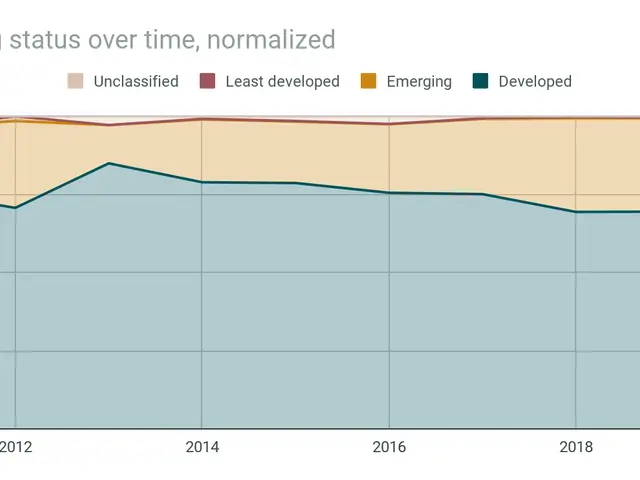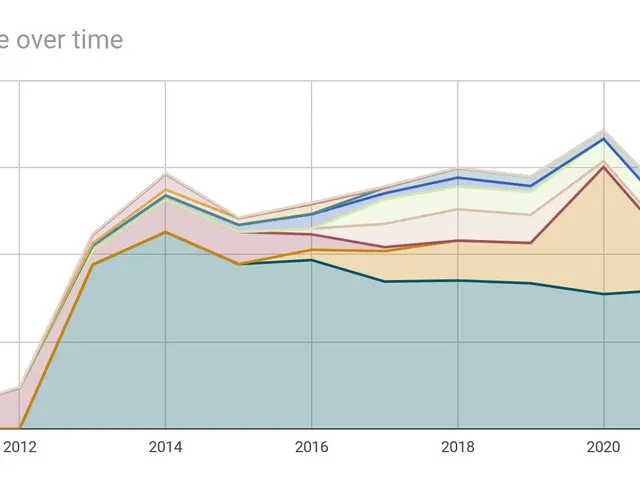Saudi Monarch and Crown Prince Extend Sympathies to Pakistani President for Flood Affected Citizens
In the northwestern region of Pakistan, the Khyber Pakhtunkhwa province, has been hit hard by recent floods that have resulted in numerous deaths, injuries, and missing persons. The floods, triggered by torrential rains and cloudbursts in Buner, have left many homes flattened by torrents of water carrying boulders, with at least 344 lives lost, primarily in Khyber Pakhtunkhwa[1].
Lt. Gen. Inam Haider, chairman of the National Disaster Management Authority, made a statement at a hastily convened news conference in Islamabad, attributing the severity of the floods to climate change[2]. Pakistan has already received 50 percent more rainfall than in the same period last year, due to shifting weather patterns caused by climate change[3].
The floods have also led to significant displacement of families, destruction of homes and crops, and economic losses. Climate change exacerbates these impacts by increasing the frequency of such disasters, which can strain local economies and resources[2][3]. The early warning system in place was unable to alert residents before the sudden downpour in Buner due to its intense nature[4].
The region's mountainous terrain makes it more susceptible to landslides and flash floods, which are exacerbated by climate-related heavy rains. This has been seen in the recent catastrophic floods across Khyber Pakhtunkhwa, amplifying the risk of flash floods and landslides[1][4].
The post-flood environment often poses health risks due to contaminated water and reduced access to basic services. Climate change can heighten these risks by increasing the likelihood of disease outbreaks following floods[1][3].
King Salman of Saudi Arabia has extended his condolences to President Asif Ali Zardari of Pakistan over the loss of life, injuries, and missing persons due to floods in Pakistan. Crown Prince Mohammed bin Salman also sent a similar cable to President Zardari[5]. The condolences were conveyed in a cable sent by King Salman[6].
Forecasters predict that severe weather will continue into early September, further increasing the risk of additional flooding and landslides. This underscores the urgent need for climate-resilient infrastructure and emergency preparedness measures[2][3].
Impact of Climate Change on Floods
- Increased Rainfall Intensity: Climate change can lead to more frequent and intense rainfall events due to warmer ocean temperatures and changes in atmospheric circulation patterns. This results in heavier monsoon rains, which have been observed in the recent floods in Khyber Pakhtunkhwa[2][3].
- Flash Floods and Landslides: The increased rainfall intensity amplifies the risk of flash floods and landslides, as seen in the recent catastrophic floods across Khyber Pakhtunkhwa. These events have devastated communities, causing widespread destruction and loss of life[1][4].
- Displacement and Economic Impact: The floods have led to significant displacement of families, destruction of homes and crops, and economic losses. Climate change exacerbates these impacts by increasing the frequency of such disasters, which can strain local economies and resources[2][3].
- Health and Infrastructure Concerns: The post-flood environment often poses health risks due to contaminated water and reduced access to basic services. Climate change can heighten these risks by increasing the likelihood of disease outbreaks following floods[1][3].
Regional Impacts
- Khyber Pakhtunkhwa Province: This province has been hit particularly hard, with districts like Buner experiencing severe damage and loss of life.
Future Risks
- Predicted Continued Extreme Weather: Forecasters predict that severe weather will continue into early September, further increasing the risk of additional flooding and landslides.
Read also:
- Amidst India's escalating climate crisis, transgender individuals continue to persevere
- Germany's three-month tenure under Merz's administration feels significantly extended
- Governing body allegedly persists in enjoying vacation time amidst Spain's highest danger level due to fires, claims Feijóo
- United Nations Human Rights Evaluation, Session 45: United Kingdom's Statement Regarding Mauritius' Human Rights Record








